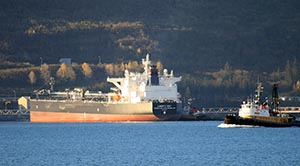
An oil spill contingency plan is a document which contains both:
- Detailed information on steps to be taken before an oil spill to prevent a spill from happening
- Detailed instructions describing activities that will be done during and after an accident to clean up an oil spill.
What is the Prince William Sound Tanker Oil Spill Contingency Plan?
This contingency plan describes the measures Prince William Sound shippers take to try to prevent, or clean up, an oil spill from a tanker.
Planning for prevention
Preventing an oil spill is the most effective strategy to protect human health and the environment. The tanker contingency plan contains detailed descriptions of the steps and equipment shippers are using to keep oil out of the water. Examples include:
- A tanker escort system to help rescue a tanker in distress
- The U.S. Coast Guard’s vessel traffic system that helps guide tankers safely in and out of Prince William Sound
- Equipment that is in place to prevent oil or other chemicals from discharging into the water
- Alcohol and drug testing which are required for mariners
- Maintaining equipment to keep proper function
- Tankers following speed limits and staying in designated lanes
- The system may be restricted or closed completely during dangerous weather or when ice is present
- Thorough training for mariners in the safe use of all equipment.
Planning for response


